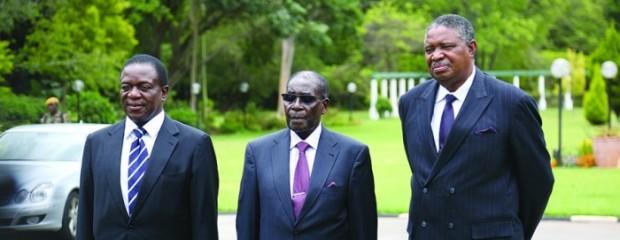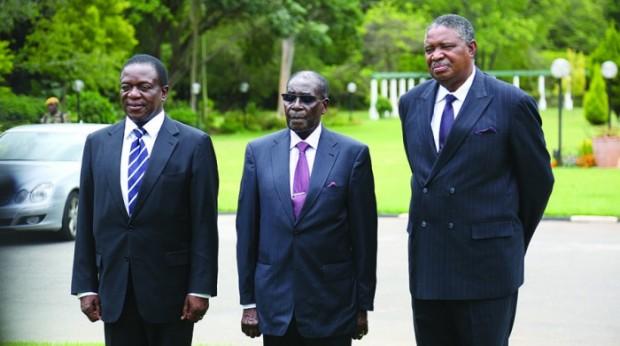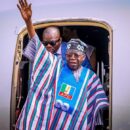Zimbabwe: The darkest hour is not before dawn – By Joost Fontein


Despite anticipated political change at the top, few Zimbabweans live in hope that things will get better for them any time soon.
Throughout the 2000s, Zimbabwe’s decade of misery, I was often struck by a cliché that frequently appeared in editorials, commentaries, and letters published in the Zimbabwean press, and could sometimes be heard in street conversations. The darkest hour, so it went, is before dawn. In the heady days of the early 2000s, when white farms everywhere were being ‘invaded’ and “˜jambanja’ was only beginning to be formalised into ‘fast track’ land reform; and when the MDC rode a wave of urban popularity, this cliché seemed to reflect a sense that real change was imminent, that something was about to happen. Things could only get better.
I remember seeing Oliver Mtukudzi in concert, and the whole audience, in unison, pulling out and waving red cards when he played Bvuma [‘tolerance’], the track that rocked Zimbabwe that year, despite being banned from the airwaves. Five years later, when I was back in Zimbabwe I encountered the cliché again. It seemed a little less convincing this time, more hope for an aspired future that might be wished into existence, than confidence of one about to arrive.
Three years later, in 2008 – when life in Zimbabwe reached the ultimate depths of despair with the terrible violence that followed the March elections, inflation reaching its eye-watering zenith, hunger widespread, shops empty, basic state delivery of water and electricity at their most unreliable – I remember encountering the same cliché again. This time it seemed to reflect the hope of absolute desperation: it really cannot get worse, so can only get better.
It should be added that this sense of hope, and sometimes optimism, was not a just feature of the remarkable mobilisation for political change that the emergence of a seemingly viable national opposition appeared to have engendered. Across Zimbabwe’s political polarisations, hope for a better future, or as I argue in a soon to be published book[1], of past futures once again made imaginable, were also provoked by Zimbabwe’s massive land reform programme, at least for the hundreds of thousands of people for whom access to productive land was made possible.
Of course this hope was not uniform or universal; there were many losers, notably farm workers who often got the worst deal of all. Nor was it consistent and enduring – it ebbed and flowed – even war veterans leading Zimbabwe’s “˜land revolution’ were often left dismayed as ‘jambanja was inflicted upon jambanja’[2], and elite capture turned the potentialities of redistribution into political patronage. But the doom and gloom of “˜authoritarian nationalism’, and the “˜end of modernity’ for a “˜plunging’ Zimbabwe, that preoccupied scholars,[3] did not always match the confidence in new and better futures that one also encountered on Zimbabwe’s streets and resettled farms.
With hindsight, all this hope seems profoundly misplaced. Things got so much worse, life became inexorably harder throughout the 2000s and the darkest hour, it often seemed, had simply not arrived yet. Until 2008 perhaps, when ZANU PF’s election defeat in March provoked a violent response that undermined its treasured regional legitimacy to such an extent that it was forced into a South Africa-mediated agreement and then a ‘Unity Government’ with the MDC. In early 2009 this provoked its own new, but brief sense of optimism, and a few diasporans returned. This was soon vanquished though as Zanu-PF’s politics of obstruction, patronage and parallel government, alongside the MDCs’ failure to offer any kind of genuinely alternative style of government, became clear. Zanu-PF’s tremendous election success of July 2013, by hook and not a little crook, to be sure, reasserted its political dominance and revealed the extent of the oppositions’ deep limitations.
In this context it is not surprising, perhaps, that on recent visits to Zimbabwe I have no longer encountered the old cliché. The darkest hour, Zimbabweans seem to have realised, is not before dawn.
Undoubtedly, life in Zimbabwe has vastly improved for many since the extreme miseries of the mid- to late 2000s. The shops are full. Cholera and typhoid, although always threatening (as again in March 2015), seem to have subsided somewhat. Violence too, although never that far away, has been tempered, but the threat of it has certainly done political work (particularly before 2013’s largely peaceful elections). Electricity and water supplies seem a little less erratic in some urban areas, and new popular ‘Mega’ complexes for music, entertainment, and braai-ing have opened up in the capital alongside busy new fast-food eateries like the derivative ‘Chicken slice’ and its ancillaries.
Most significantly, perhaps, the abandonment of the moribund Zimbabwean dollar and the multi-currency regime adopted in 2009 brought stability to the economy. But that stability has now, it appears, turned into stagnation. And this is perhaps the most overwhelming impression that a recent visit to Zimbabwe has left me with: profound stagnation, despondency and a complete absence of any hope or optimism that meaningful change might be around the corner.
We must always be careful with our generalisations, particularly when discussing things as abstract and ephemeral as “˜hope’, “˜optimism’, or indeed “˜despair’. The sense of stagnation and despondency I am discussing can only ever be my own impression, yet it is one conjured up from numerous encounters with friends, family and strangers in Harare’s streets and across the rural areas that I visited as 2014 turned into 2015. Newspaper reports suggest this despondency set in soon after the July 2013 elections, reflecting the stagnation that quickly followed the economic respite of the Unity Government years. By October 2013 it seemed unlikely that “˜Zim Asset’, ZANU PF’s five year “˜economic blueprint’ for “˜the turnaround and development of the economy’, could achieve anything beyond revealing its own forlornness, as the ruling party’s intense internal succession battles began to rage.[4]
Not much had changed a year later. By Christmas 2014, a friend of mine working in a mid-level management job for Harare City Council had not been paid since September. The city council owes him 5,000 US dollars. With unemployment still at least 80%, he is lucky to have job. Those state employees who did get their Christmas bonuses, and most did not, only received them well into 2015. Many others still wait to be paid. Towards the end of 2014 and into 2015 state employees in various sectors, including nurses and doctors, contemplated or went on strike. In February, railway workers too went on strike having not been paid for 9 months. Many others hardly see the point. Everywhere the dilapidation of roads and infrastructure continues. Everyone seems to be trying sell something to everyone else – mainly cheap Chinese imports. Occasionally there are police and council efforts to remove informal traders, or catch unlicensed taxi operators, but even such “˜operations’ lack the conviction of their violent equivalents in the 2000s.
The government imported specially minted “˜bond coins’ in December to ease shortages in small change that were said to be artificially driving up prices of basic commodities, but commuter buses and many small shops refuse to accept them, fearing they are a precursor to the reintroduction of the Zimbabwean dollar, revealing common suspicions of the government’s financial intentions and its competence. There is also much anecdotal evidence to suggest that diaspora remittances, which kept many Zimbabweans afloat in the worst years of the 2000s, are dwindling. Many diasporans have been away for so long that their lives are now based abroad. For many, Zimbabwe has become a place to visit relatives, and maybe one day, in the distant future, to retire to, or to die.
The history of Zimbabwe in the late 1990s and early 2000s, can be (crudely) characterised as a series of recursive movements from optimism to hope to optimism and back again – each marked by numerous intermediate and shorter term to-ing and fro-ing between hope and optimism for different people, in different ways – as prospects for immediate change gave way to longer-term hopes that a better future was still forthcoming, and back again. If this is a fair caricature of the 2000s, then this seems now to have changed. Few in Zimbabwe seem to have any confidence that things are going to change for the better any time soon, whether in the immediate, or in the longer, more abstract future. Of course, people still live their lives facing forward – what choice do they have? – But mostly it seems they are playing a much longer game. Any real change is 10, 15, even 20 years away.
The irony of this situation is that it does seem that finally something really is going to change soon, at least in terms of the players at the top. Zanu-PF’s internal factionalisms and succession squabbles achieved a new intensity lately with the vice–president, Joice Mujuru, publically vilified for months by the president’s deeply unpopular wife and then sacked unceremoniously amid accusations of betrayal, corruption and treason. This happened alongside the crude removal of numerous long-standing ministers and countless provincial party cadres, including the leader of the war veterans association, Jabulani Sibanda, who was for a time arrested and imprisoned. New political alignments are emerging almost daily. It all suggests that something is finally changing.
People I spoke to were aware of ZANU PF deepening internal squabbles. But few people seemed to care very much and no one I met was in anyway mobilised by it, beyond some expressing a mild preference for Mujuru. Such preference as was expressed to me was not of the same ilk as the hyperbolic announcements of zealous loyalty that some of Zanu-PF politicians quickly made to the new vice-president Emmerson Mnangagwa, but were more like references to the better of two bad options. Mostly these Zanu-PF squabbles seem irrelevant for the everyday lives of most Zimbabweans.
As one Zimbabwean colleague put it, people appear to have succumbed to a profound fatigue of anything to do with politics. Since July 2013, opposition politics seems to inspire almost no one anymore. If change is now imminent, this no longer seems to engender anything like the oscillating hopes and optimisms of the 2000s. Whatever political changes are likely to happen in the next few years, as age takes its inevitable dues, there seems among many everyday Zimbabweans to be a profound lack of confidence that this will actually offer any meaningful improvement in their everyday lot.
If in the 2000s an unlikely confidence in imminent change engendered hope and optimism across diverse contexts, then the very real possibility of imminent change now, or soon, seems to have done the opposite. Despondency is prevalent and a new timescale of hope and aspiration has taken hold that makes both the present and any immediate future appear equally uninspiring. If people are just waiting, as many have suggested, most have resigned themselves to the long haul.
Joost Fontein is Director of the British Institute in Eastern Africa.
[1] Fontein, J. (2015) Remaking Mutirikwi: Landscape, Water & Belonging in Southern Zimbabwe Oxford: James Currey.
[2] Sadomba, W. (2011) War Veterans in Zimbabwe’s Revolution Oxford: James Currey.
[3] Bond, P. & Manyanya, J. (2003) Zimbabwe‘s Plunge: Exhausted Nationalism, Neo-liberalism and the Search for Social Justice Harare: Weaver Press; Campbell, H. (2003) Reclaiming Zimbabwe. The Exhaustion of the Patriarchal Model of Liberation New York: Africa World Press; Raftopoulos, B. (2003) “˜The State in Crisis: Authoritarian Nationalism, Selective Citizenship and Distortions of democracy in Zimbabwe’ in Hammar A., Raftopouos B. & Jensen S. (eds), Zimbabwe‘s Unfinished Business (Harare: Weaver Press). Worby, E. (2003) “˜The End of Modernity in Zimbabwe? Passages from Development to Sovereignty’ in Hammar A., Raftopouos B. & Jensen S. (eds.) Zimbabwe‘s Unfinished Business Harare: Weaver Press.
[4] See Brian Raftopoulos 2014 ‘Zimbabwean Politics in the Post-2013 Election period’ (African Spectrum 2/2014 91-103)for a good account of politics in Zimbabwe after July2013






Spot on, allthough in some quiet corners some were expressing the wild wild wish that the Crocodile might just decide be a hero and put the country first and foremost!
When people listen to those who only talk the walk, and do not rationally try to see how things will be affected, this is the disaster, that will happen…Just vilify “whitey”, and off ‘ya go, right down the drain, is about it…Africa’s problem has always been Africa, from the salve trade on, it was almost always sectarian actions of tribal warfare and disrespect, that have been at the bottom, of discord and tragedy…Can’t build a building if there’s not a good foundation…, and Mooo-grabme and Goodluck getting anything back are perfect examples, of uncaring blabbermouths, who aren’t fit for dog-catcher…
I am sad to see my birth country
totally destroyed.It was once the country
to live in.
Nigel Thompson
Phuket
Thailand
intresting observations in this article
This is a brilliant analysis of the current Zimbabwean situation. Please give us more.
This is a very brilliant commentary on Zimbabwe. I would like to continue to receive more from you. Thanks a lot.
It cannot be disputed that what the author is saying is quite accurate. However, my worry is that this British author is not explaining to readers why Zimbabwe is finding itself in such a sorry state. What role has hegemonic America and his country (UK) played in this? Please, avoid giving us one sided analyses.
A very accurate of what is happening in Zimbabwe. Writer did his homework very well.
Sadly so very true… we the Zimbabweans have lost all hope and our only hope now seems to be to get out… but where do we go when it’s become so difficult to get out… and how do we stay when every day life is becoming so impossible. What also needs to be mentioned here is the severe lack of medical care in an emergency… it’s cash up front or die somewhere else.
Very interesting article. We pray for Zimbabwe though it is no better in my country, we still have hope. The last thing to lose in this world is hope. We always hope that tomorrow will be better than today even if it happens the other way around. To my brother Silver Django, let us not have this asinine mentality that our problems are caused by foreigners. We created them, so let us solve them.